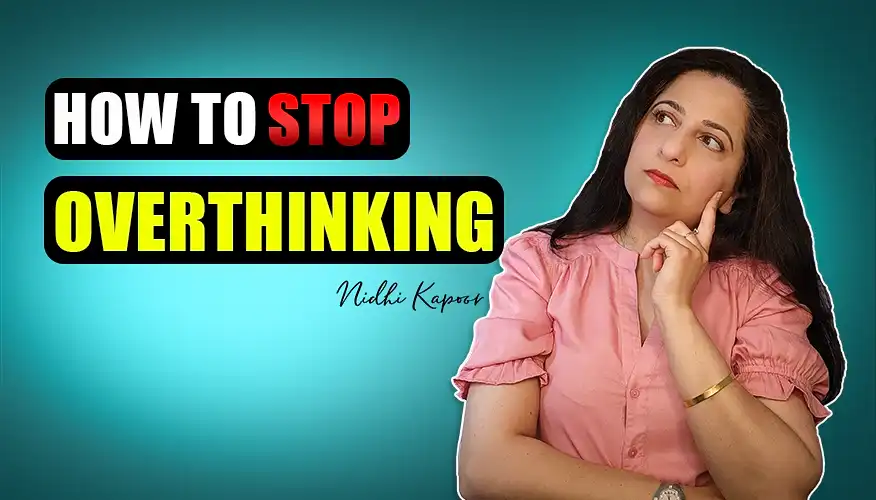Have you ever found yourself ensnared in the intricate web of overthinking, unable to escape the relentless cycle of thoughts that keep you tossing and turning at night? If you have, you’re not alone. Overthinking is a universal experience that affects us all, but fear not – it’s time to break free from its grip. Let us unravel the secrets to silence the chaos in your mind and embark on a journey toward a life of clarity and boosting your confidence. So, if you’re ready to regain control, let’s dive into the art of conquering how to stop overthinking!
Overthinking, that sneaky thief, can snatch away your peace, time, and clarity. But here’s the good news: you have the ability to take back control of your thoughts and live a more mindful, focused life. Let’s explore some practical strategies to stop overthinking and savors the beauty of the present moment.
The Power of Language: Painting Your Mind’s Canvas
Imagine your mind as a canvas, with your words as the vibrant paint that brings it to life. Language is a powerful tool that influences our thoughts and emotions more than we often realize. When we use negative language, it’s like painting a gloomy picture on the canvas of our minds. Let’s switch from “I can’t stand it” to “I can handle it,” from “This is a nightmare” to “This is a challenge I can conquer,” and from “I’m dying here” to “I’m learning and growing through this.” Transform your mental landscape into a masterpiece of resilience and optimism by choosing your words wisely. Read more of my blogs post
This change isn’t just about words; it’s about beliefs and actions. It’s about turning your empowered words into self-fulfilling prophecies that lead to outcomes matching your newfound confidence. So, if you’re looking to bid farewell to overthinking and anxiety, start by being mindful of the words you choose.
Identifying Your Triggers: Weathering the Mental Storms
Just like weather patterns can change rapidly, our thoughts can become turbulent and lead to overthinking. Imagine your mind as an ocean – vast, unpredictable, and sometimes stormy. What stirs the waters? Triggers. They can impact anyone, no matter their status or success. Much like meteorologists prepare for storms, you can prepare for your mental storms by identifying your triggers. Grab a piece of paper, jot down your triggers, and take the first step toward gaining control over your thoughts.
To learn more about Life Coach please visit: nidhikapoor.com
The Garden of Mindfulness: Tending to Your Thoughts
Visualise your mind as a garden, and your thoughts as seeds. Mindfulness is the practice of staying fully present and aware of your thoughts and feelings without judgment. It’s like observing flowers bloom without trying to change anything. By being mindful of your triggers, you can catch negative thoughts as they sprout, preventing them from growing into overwhelming weeds. Accept that a thought is just a thought until you give it power. Cultivate your mental garden with mindfulness, and remember – you have the power to control your thoughts.
Acceptance and Positive Reframing: Weathering Life’s Storms
Life is like a vast ocean with waves of experiences and situations. Sometimes, you encounter storms you can’t control. Acceptance is like acknowledging that you can’t change the tide but can choose how to perceive it. Embrace the reality of situations, find the silver lining in challenging moments, and shift your focus to a more positive outlook. By changing the way you talk about situations, you reduce overthinking and stress. Remember, if you can’t change a situation, you can change how you view it.
Dis-identification and Self-Reflection: Creating Mental Space
Envision your mind as a vast forest with trees representing various aspects of your life. To overcome overthinking, dis-identify from external aspects. Acknowledge everything that is not truly you – your physical surroundings, roles, possessions, and even your thoughts. By distancing yourself from external identifications, you create mental space and silence. This mental space allows you to reflect on your true essence, accessing profound energy and intensity within yourself. Read more: Mastering Habits Positive Change: Your Simple Guide
Congratulations! You’ve reached the end of our journey on how to stop overthinking. The power to change the way you think is in your hands. By recognizing your triggers, staying mindful, accepting life’s challenges, and letting go of what doesn’t define you, you’re unlocking the door to a more focused, confident, and exciting life. Think of these changes as simple but powerful keys to unlocking a brighter future.
Let your thoughts lead you to a life free from the burden of overthinking.
Until next time, take care and embrace the wonderful journey ahead!
FAQ for How to Stop Overthinking
Q1. What is overthinking a symptom of?
Overthinking often appears as anxiety, stress, and a drive for perfectionism. Excessive worry often stems from an underlying fear or concern.
Q2. Why do I overthink so much?
You may overthink because you’re stressed, anxious, or want to be in charge. It may also be caused by uncertainty about the future or a fear of making mistakes.
Q3. What are overthinkers excelling at?
Because overthinkers think things through thoroughly, they are frequently skilled at solving problems, examining details, and projecting possible outcomes.
Q4. Is overthinking harmful?
Yes, overthinking can be harmful. It can lead to increased stress, anxiety, and indecision, as well as a negative impact on mental health and sleep.
Q5. Is overthinking OCD?
Though persistent, bothersome thoughts can be a sign of OCD, overthinking is not always associated with OCD. Overthinking is another feature of many anxiety disorders.







